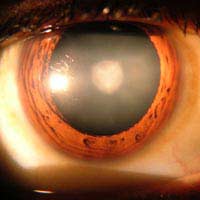Cataract Risk from HRT

Cataracts refer to a common eye disorder that affects many Britons and others around the world. With our population living longer than ever before, we are frequently seeing more people developing cataracts, particularly in their older years.
How HRT Affects Cataracts
A new study tracked over thirty thousand postmenopausal women over an eight-year time period. It found that the women who were using hormone replacement therapy (HRT) or had previously used it had a higher rate of cataract removal. It is an important study that suggests you should consider this effect with your doctor before choosing to take HRT.What are Cataracts?
A cataract is a type of clouding that happens in your eye. Specifically, the crystalline lens or envelope is where you start to get anything from a subtle clouding to total opacity. This makes it significantly more difficult for light to pass through, causing near-sightedness. Also, a slow-building yellowing and progressive opacity of the lens can make it harder to properly see blue colours.Cataracts usually develop quite slowly but they do cause you to lose vision and if they are not treated, can cause blindness. While both of the eyes are typically affected, one eye usually shows signs and symptoms before the other.
Higher Risk of Cataracts
For the women who participated in this study, it was found that approximately 4,300 cataract removal surgeries were done over the eight-year window of time. This translated to an increased 14 percent risk for women who had used HRT at some point in their life.It was an 18 percent risk for the women who were currently using HRT. This is, of course, compared to women who had never taken HRT at any time. Overall, the longer a woman used HRT, the higher her risk of cataracts.
Postmenopausal Risks of Cataracts
In postmenopausal women, there is already a higher risk of developing cataracts compared to men in the same age range. Researchers think that this higher risk relates to hormones, explaining why the use of HRT has such a significant effect on the development of cataracts.In fact, there are even oestrogen receptors that have been identified within the lens of the eye. The lens is the part that gets clouded and loses flexibility when a cataract starts to form. While naturally occurring oestrogen seems to have a protective effect on the eye in terms of cataract formation, the oestrogens in HRT do not work the same way in the body.
The Role of Alcohol and Smoking in Cataracts and HRT
Alcohol was also a factor, where researchers found that it increased the negative effect the HRT had in the development of cataracts. The current HRT users who drank more than one alcoholic beverage a day had a 42 percent increased risk of developing cataracts.Smoking, however, did not link up to an increased risk. These kinds of daily use factors are important to establish in research because they help us to understand how certain lifestyle factors join with drug effects to influence our health.
Choosing Menopause Treatments
While there is a tendency to assume a treatment is ‘bad’ when we hear about a research study suggesting problems with its use, you should not shy away from HRT too quickly. It is very much an individual choice.You must not only balance the known risks and benefits but also factor in your own health situation. This is where your doctor comes in to help inform you and guide you toward the right decision, whether that is HRT or another menopause treatment.
- Why More Women Today Experience Early Menopause
- How Childbirth Affects Menopause Timing
- Lung Cancer and Anti-Oestrogen Drugs
- How Ethnicity Affects Menopause
- Predicting Menopause from the Womb
- Breast Health After Menopause
- HRT and Kidney Stones
- Oestrogen and Vascular Disease
- Breast Density Changes from HRT
- Body Composition Changes After Menopause
- Follicle Stimulating Hormone and Your Bones
- A Healthy Weight After Menopause
- Better Skin During Menopause
- Conditions Associated with Menopause
- A Guide to Endocrinology
- When Does Menopause Occur?
- Menopause and Bone Health
- Chemotherapy and Menopause Link
- Understanding the Sex Hormones
- Menstruation Patterns During Menopause
- Common Menopause Symptoms
- Basics of Female Reproduction
- What Causes Menopause?


Re: How Childbirth Affects Menopause Timing
I have give.live brithday to 10 children but have had a total of 13 prengacy, so my question is can this cause my…
Re: Positive Lifestyle Changes
i m giving councelling for menopause since few months in my gyn opd. this all info.was very imp and useful for me tnanks
Re: Why More Women Today Experience Early Menopause
Poppy - Your Question:Hi I am 42 female'. My periods have suddenly changed. For the past three months…
Re: Why More Women Today Experience Early Menopause
Hi I am 42 female'. My periods have suddenly changed. For the past three months instead of my regular 7…
Re: Soy Isoflavones & menopause
Bo jangles - Your Question:Can I take soy isoflavones along with Evorel 50 patches?I change my patch between every 2-3 days…
Re: Soy Isoflavones & menopause
Can I take soy isoflavones along with Evorel 50 patches? I change my patch between every 2-3 days because it dries out so…
Re: HRT and Migraines
I stopped taking the combined hrt tablet 2 weeks ago on my docs advice. I had been on it for 5 years. I'm 56 years old. Other than a few warm…
Re: HRT and Migraines
i get very up set alot. am stillhaving bad pain. and get very moody as well
Re: Do Your Genes Mean Early Menopause?
i have been having perimenopausal symptoms for a decade with low calcium and osteoarthritis before 40. now am taking…
Re: Treating Hot Flushes with Blood Pressure Drugs
Debbie - Your Question:Hi I had breast cancer grade 3 stage 3 five years ago and had my ovaries taken out…